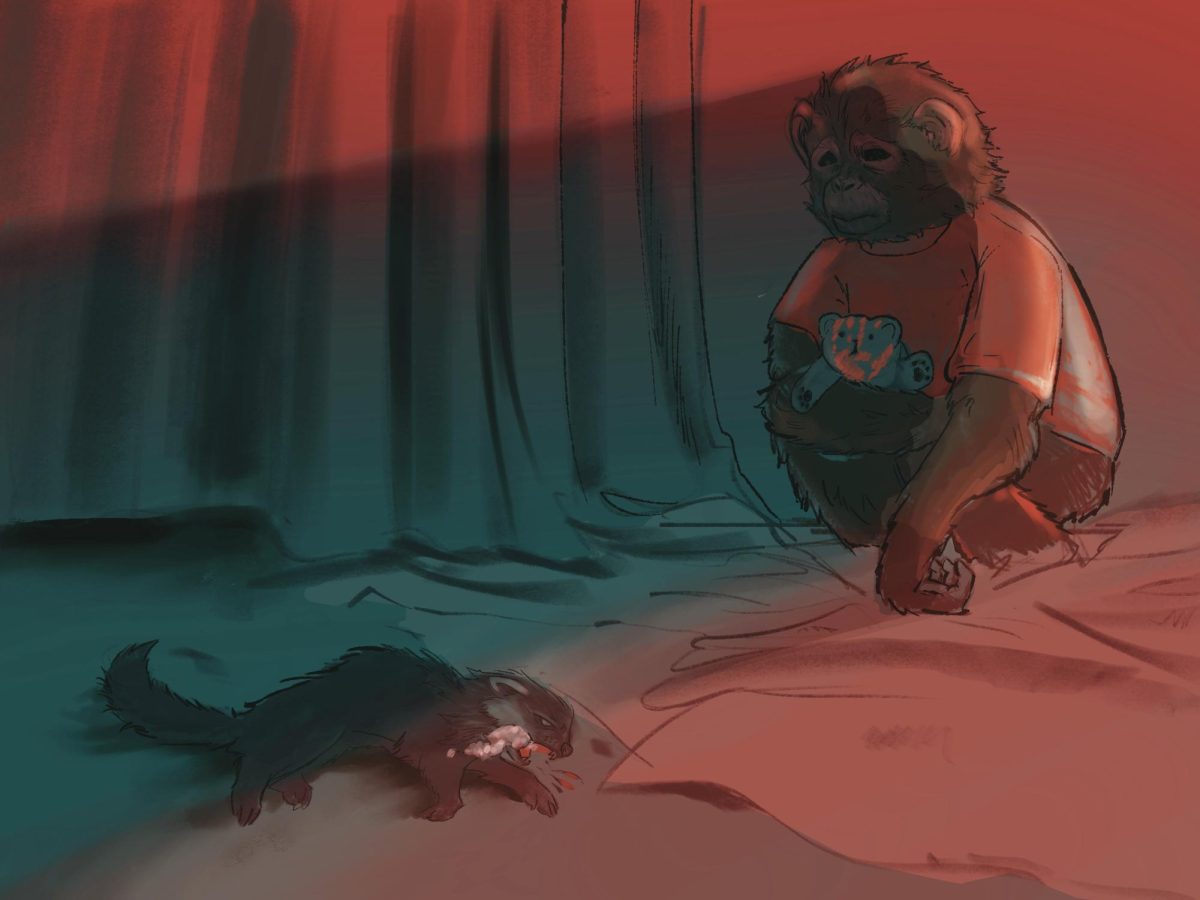Indie folk band, The Lumineers, released its third studio album, III, along with III – The Short Film, which contributed to the storyline and theme of the album visually and emotionally.
The film had its premiere at the Toronto International Film Festival on Sept. 8. There was a special screening of the short movie at Pier 17 in downtown Manhattan on Sept. 12, followed by a Q&A session and a live acoustic performance by the band.
Band members Wesley Schultz and Jeremiah Fraites answered fan’s questions about III and shared their personal connections with the themes of addiction and pain.
Schultz explained that he has a relative who had been struggling with alcoholism, and she ended up living on the streets.
Fraites also revealed to the audience that his brother passed away years ago because of drug overdose.
The album consists of 10 songs and three bonus tracks formed around a storyline of lives being ruined due to alcoholism and drug abuse. The album tells the stories of three generations of the fictional Sparks family: Gloria, Junior and Jimmy.
The most powerful songs in the album are the first three tracks: “Donna,” “Life in the City” and “Gloria.”
The first song “Donna” is a slow, piano-heavy piece that gives background information about the character Gloria.
Donna is Gloria’s mother, and she did not have a strong connection to her daughter while she was alive. The chorus says, “You hate the name Donna,” first, and then goes, “You hate the name Junior.” This shows the lack of love Gloria felt towards her mother and grandson.
It can be assumed that Donna was not very loving towards Gloria as the song goes, “If you don’t have it/then you’ll never give it/And I don’t blame you for the way you living.”
The part that says, “The little boy was born in February/You couldn’t sober up to hold a baby,” starts to give signals of Gloria’s addiction and how it affected her relationship with her son.
“Life in the City” portrays the loneliness of the city while creating a conflict seen in the short film as a result of the “low life,” Gloria is living with her addiction and the repercussions from it.
The song focuses more on the loneliness part of the story, stating, “And if you leave, don’t leave me all alone/ ‘Cause I’ll be scared, I’ll be naked, I’ll get cold.”
However, the film focuses more on Gloria’s addiction and how she is creating a huge conflict with her significant other while trying to deal with her various mental problems.
There is a possible attribution to the band’s previous album Cleopatra in “Life in the City” as well, when lead singer Schultz sings, “And I miss my dad and Cleopatra sitting on a phone.”
“Gloria” is more fast-paced and almost upbeat compared to other tracks in III. It solely explains Gloria’s addiction and her life falling apart.
The song follows a quick and steady pattern, saying “Gloria, I smell it on your breath/Gloria, booze and peppermint/Gloria, no one said enough is enough/Gloria, they found you on the floor/Gloria, my hand was tied to yours/And, Gloria, did you finally
see that enough is enough?”
The pace and repetition make the song stand out in the album, identifying Gloria as the main character who started a chain reaction through a life riddle with addiction, which will then pass on to her son and grandson.
“It Wasn’t Easy to Be Happy for You” portrays Gloria’s grandson Junior’s heartbreak, with a lighter tone provided by an acoustic guitar.
The next two songs, “Leader of The Landslide” and “Left for Denver,” continue his story, showing the dynamics between Junior and his problematic father Jimmy.
“My Cell” starts the story of Gloria’s son Jimmy. As the rest of the songs — “Jimmy Sparks,” “April” and “Salt and the Sea” — play, it is clear that the last part of the album is heavily melancholic and portrays Jimmy as a wounded, lost man. Each songs’ carefully tailored lyrics tell the listeners about the heavy struggles of Jimmy as a person and a father.
III has an intimate narrative, featuring band members’ personal tragic experiences and the
specific setting of New York City. Schultz said that he lived in Brooklyn during the Q&A at Pier 17, and the Myrtle Broadway subway station is mentioned on “Life in the City.”
Schultz also told a story about how he used to drive to New Jersey to play music after Fraites moved there.
As the song “Donna” goes, “We drove from New Jersey/The trucks always made you worry,” The Lumineers seem to have put a
great deal of personal details and experiences into this album.
III – The Short Film helps the songs come alive. It accelerates the emotions and the stories between the songs with powerful visual elements.
Its sonic quality, accompanied by the cinematographic experience make III stand out not only as an album, but a storytelling masterpiece.Indie folk band, The Lumineers, released its third studio album, III, along with III – The Short Film, which contributed to the storyline and theme of the album visually and emotionally.
The film had its premiere at the Toronto International Film Festival on Sept. 8. There was a special screening of the short movie at Pier 17 in downtown Manhattan on Sept. 12, followed by a Q&A session and a live acoustic performance by the band.
Band members Wesley Schultz and Jeremiah Fraites answered fan’s questions about III and shared their personal connections with the themes of addiction and pain.
Schultz explained that he has a relative who had been struggling with alcoholism, and she ended up living on the streets.
Fraites also revealed to the audience that his brother passed away years ago because of drug overdose.
The album consists of 10 songs and three bonus tracks formed around a storyline of lives being ruined due to alcoholism and drug abuse. The album tells the stories of three generations of the fictional Sparks family: Gloria, Junior and Jimmy.
The most powerful songs in the album are the first three tracks: “Donna,” “Life in the City” and “Gloria.”
The first song “Donna” is a slow, piano-heavy piece that gives background information about the character Gloria.
Donna is Gloria’s mother, and she did not have a strong connection to her daughter while she was alive. The chorus says, “You hate the name Donna,” first, and then goes, “You hate the name Junior.” This shows the lack of love Gloria felt towards her mother and grandson.
It can be assumed that Donna was not very loving towards Gloria as the song goes, “If you don’t have it/then you’ll never give it/And I don’t blame you for the way you living.”
The part that says, “The little boy was born in February/You couldn’t sober up to hold a baby,” starts to give signals of Gloria’s addiction and how it affected her relationship with her son.
“Life in the City” portrays the loneliness of the city while creating a conflict seen in the short film as a result of the “low life,” Gloria is living with her addiction and the repercussions from it.
The song focuses more on the loneliness part of the story, stating, “And if you leave, don’t leave me all alone/ ‘Cause I’ll be scared, I’ll be naked, I’ll get cold.”
However, the film focuses more on Gloria’s addiction and how she is creating a huge conflict with her significant other while trying to deal with her various mental problems.
There is a possible attribution to the band’s previous album Cleopatra in “Life in the City” as well, when lead singer Schultz sings, “And I miss my dad and Cleopatra sitting on a phone.”
“Gloria” is more fast-paced and almost upbeat compared to other tracks in III. It solely explains Gloria’s addiction and her life falling apart.
The song follows a quick and steady pattern, saying “Gloria, I smell it on your breath/Gloria, booze and peppermint/Gloria, no one said enough is enough/Gloria, they found you on the floor/Gloria, my hand was tied to yours/And, Gloria, did you finally
see that enough is enough?”
The pace and repetition make the song stand out in the album, identifying Gloria as the main character who started a chain reaction through a life riddle with addiction, which will then pass on to her son and grandson.
“It Wasn’t Easy to Be Happy for You” portrays Gloria’s grandson Junior’s heartbreak, with a lighter tone provided by an acoustic guitar.
The next two songs, “Leader of The Landslide” and “Left for Denver,” continue his story, showing the dynamics between Junior and his problematic father Jimmy.
“My Cell” starts the story of Gloria’s son Jimmy. As the rest of the songs — “Jimmy Sparks,” “April” and “Salt and the Sea” — play, it is clear that the last part of the album is heavily melancholic and portrays Jimmy as a wounded, lost man. Each songs’ carefully tailored lyrics tell the listeners about the heavy struggles of Jimmy as a person and a father.
III has an intimate narrative, featuring band members’ personal tragic experiences and the
specific setting of New York City. Schultz said that he lived in Brooklyn during the Q&A at Pier 17, and the Myrtle Broadway subway station is mentioned on “Life in the City.”
Schultz also told a story about how he used to drive to New Jersey to play music after Fraites moved there.
As the song “Donna” goes, “We drove from New Jersey/The trucks always made you worry,” The Lumineers seem to have put a
great deal of personal details and experiences into this album.
III – The Short Film helps the songs come alive. It accelerates the emotions and the stories between the songs with powerful visual elements.
Its sonic quality, accompanied by the cinematographic experience make III stand out not only as an album, but a storytelling masterpiece.









